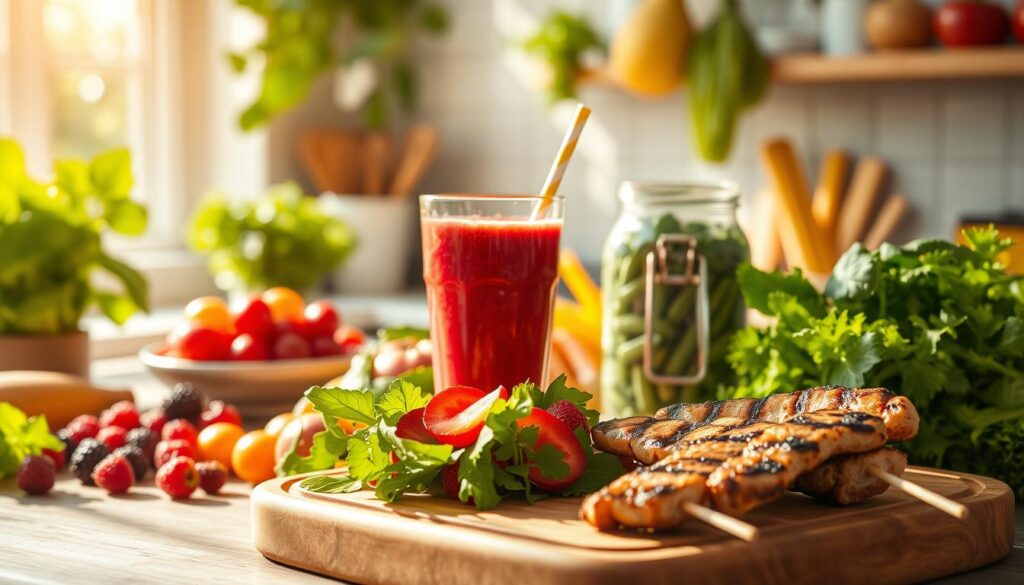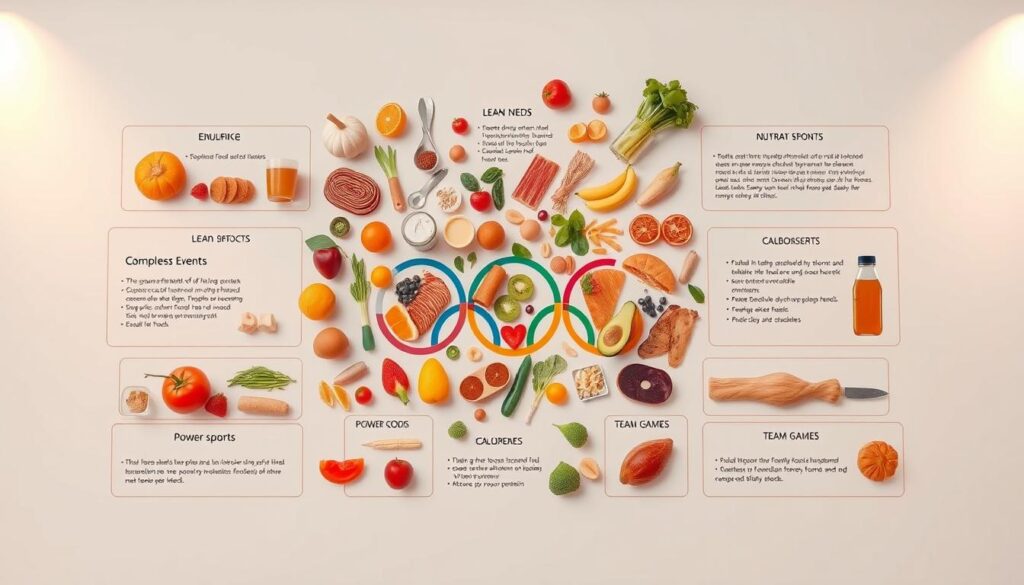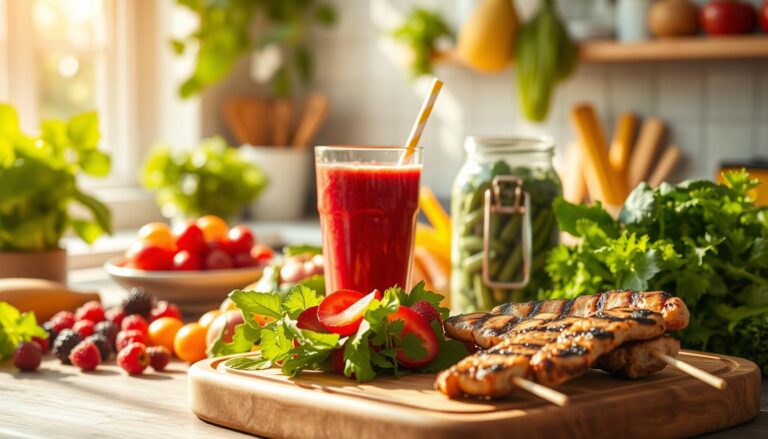Exploring the world of Olympic athletes reveals a surprising fact. Many elite athletes stick to very strict diets to perform at their best. The Olympics showcase human physical achievement, and nutrition is key to their success.
For example, Dave Ryding’s win in the World Cup and Reece Bell’s prep for the World Championships show nutrition’s importance. In this article, we’ll uncover the truth about Olympic athletes’ diets and what makes them different.
Introduction to Olympic Athletes’ Diets
Olympic athletes’ diets are often a mystery. People wonder what they eat to perform so well. We’ll look into their extreme and sometimes strange diets.
These diets include very few calories and unusual foods. We’ll explore what makes Olympic athlete diets unique. This highlights the need for a good nutrition plan and how it affects their training.
Key Takeaways
- Olympic athletes follow extremely restrictive diets to achieve their remarkable performances
- Nutrition plan for Olympic athletes plays a critical role in their success
- Performance nutrition for athletes is essential for their training outcomes
- Olympic athletes’ diets are often shrouded in mystery
- Unconventional nutrition plans can help athletes push the boundaries of human performance
- A well-planned nutrition plan for Olympic athletes can significantly impact their performance
Understanding the Importance of Diet for Olympic Athletes
As an athlete, I know how key a good diet is. It helps with endurance, strength, and speed. Olympic dietitians say a diet should fuel energy, recovery, and health.
Good nutrition is vital for athletes. Eating a variety of whole foods is important. This includes fruits, veggies, whole grains, and lean proteins. Drinking lots of water is also key. It helps keep the body cool and moves nutrients around.
Important things for athlete diets include:
* Eating often to keep energy up
* Eating colorful fruits and veggies for vitamins and minerals
* Choosing whole grains for carbs
* Picking lean proteins for muscle repair
Following these tips and using Olympic dietitian advice can help athletes perform better. A good diet is essential for success, whether you’re a pro or just starting.
A Closer Look at Common Diet Trends Among Olympians
Olympic athletes follow many diet trends to boost their performance. Healthy eating is key for them. It’s interesting to see how different diets affect their performance.
Two popular diets among Olympians are plant-based and high-protein. Plant-based diets use whole foods for energy. High-protein diets help build strength. Both have benefits and challenges for athletes.

- Ensuring adequate protein intake to support muscle growth and repair
- Consuming complex carbohydrates for sustained energy
- Staying hydrated to maintain optimal performance
Knowing about these diets helps Olympians choose the best nutrition. This gives them an edge in their sports.
The Concept of “Forbidden Foods”
Athletes work hard to get better, focusing on what they eat. They pick foods that help them perform at their best. But, some foods are off-limits because they can hurt their performance. It’s important for athletes to know which foods to avoid.
Restricted Foods and Their Impact
Some foods, like sugary snacks and processed meats, are not good for athletes. They don’t have much nutrition and can harm performance. A good meal plan helps athletes stay away from these and choose better foods.
The Psychological Impact of Food Restrictions
Restricting food can affect athletes’ minds, leading to unhealthy eating habits. It’s key for athletes to eat well but also enjoy food sometimes. This way, they can keep a good relationship with food and perform better.
| Food Type | Potential Impact on Athletic Performance |
|---|---|
| High-sugar snacks | Energy crashes, decreased endurance |
| Processed meats | Increased inflammation, decreased recovery |
Unique Dietary Needs Based on Sport Type
As an athlete, I know how key a good nutrition plan for Olympic athletes is. Different sports need different diets. For example, runners need lots of carbs, while sprinters need more protein.
A good athlete meal plan must match the sport’s energy needs. Here are some tips for various sports:
- Endurance sports: high complex carbohydrates, moderate protein, low fat
- Power sports: high protein, moderate complex carbohydrates, low fat
- Team sports: balanced diet with a mix of carbohydrates, protein, and healthy fats

Knowing your sport’s dietary needs helps you make a personalized nutrition plan for Olympic athletes. A well-thought-out athlete meal plan can greatly improve your performance, whether you’re a runner or a sprinter.
Misconceptions About Olympic Athletes’ Diets
Exploring Olympic athletes’ diets reveals many myths. One big mistake is thinking they don’t eat carbs. But, carbohydrates are key for their energy during tough training. Dietitians suggest eating complex carbs like whole grains and fruits.
Another myth is that they live on sugar and energy drinks. While some athletes might use these, they’re not the main food. Many athletes stick to diet tips for athletes that promote whole, nutritious foods. Here are some common myths about Olympic athletes’ diets:
- Avoiding carbohydrates altogether
- Consuming high amounts of sugar and energy drinks
- Following a highly restrictive diet
Olympic athletes get meal plans from dietitians tailored to their needs. These plans mix carbs, protein, and fats for best performance. By following Olympic dietitian recommendations and diet tips for athletes, anyone can make a balanced meal plan for their fitness goals.
Meal Timing and Nutrient Timing
As an athlete, I know how key fueling is for sports performance. Meal prep for elite athletes is more than just eating right. It’s also about when you eat.
Understanding Nutrient Timing
Nutrient timing means eating certain foods at specific times for best results. This includes carbohydrates for energy, protein for muscle repair, and healthy fats for lasting energy.
Optimizing Meal Timing
To time meals right, I look at a few things:
- When to eat meals and snacks before and after training
- The type and amount of nutrients I eat
- My own nutritional needs and likes
By thinking about these, I make a meal plan that boosts my sports performance and health.
| Nutrient | Timing | Benefits |
|---|---|---|
| Carbohydrates | 1-3 hours before training | Provides energy for optimal performance |
| Protein | Within 30-60 minutes after training | Supports muscle repair and recovery |
Recipes and Meal Plans from Top Athletes
As an athlete, I know how key healthy eating for athletes is for top performance. Many top athletes choose specific recipes and snacks to keep their energy up. A Mediterranean diet, with whole grains, fruits, and veggies, is a favorite among them.
Staying hydrated and fueled all day is vital for performance nutrition for athletes. Athletes love snacks like cashews, popcorn, and olives. These snacks are tasty and give a quick energy and nutrient boost. Here are some snacks athletes might enjoy:
- Harvest Snaps baked pea snacks
- Undercover chocolate quinoa crisps
- Lesser Evil’s Himalayan Gold popcorn
Many athletes also prep meals to meet their nutritional needs all week. Healthy eating and staying hydrated help improve performance and recovery. Athletes should aim for 6-8 meals daily, balancing carbs, proteins, and fats.
By following these tips and adding healthy recipes and meal plans to their diet, athletes can reach their goals. Whether you’re a pro athlete or just starting, focusing on healthy eating for athletes and performance nutrition for athletes is key to success.
| Snack | Benefits |
|---|---|
| Cashews | Good source of plant-based protein |
| Popcorn | Whole grain and good source of fiber |
| Olives | Rich in healthy fats and antioxidants |
Hydration: The Overlooked Aspect of Athletic Diets
As an athlete, I know how key a good diet is. This includes athlete meal plans and diet tips for athletes. But, one important part of diet is often missed: staying hydrated. Drinking enough water is key for top performance. Even a little dehydration can hurt an athlete’s stamina and results.
Studies show about 60% of athletes don’t drink enough water during workouts and games. This can make them lose 2% of their body weight, cutting their performance by 10%. To stay hydrated, athletes should drink 500-1000 ml of water each hour, based on how hard they’re working.
Here are some key tips for staying hydrated:
- Drink water all day, not just when you’re working out
- Try to drink 500-1000 ml of water each hour, based on how hard you’re working
- Watch your urine color to see if you’re drinking enough – dark yellow or amber means you might be dehydrated
By focusing on drinking enough water, athletes can boost their stamina. They can also lower injury risks and do better overall.
The Role of Supplements in an Olympic Diet
Athletes often think about using supplements to boost their performance nutrition for athletes. But, it’s key to know how supplements fit into an Olympic diet. They should help fill nutritional gaps, not be a substitute for a good diet.
Supplements like protein powder, creatine, or other substances are popular among Olympians. They help with muscle repair, energy, and endurance. Here are some common ones:
- Protein powder to support muscle repair and growth
- Creatine to increase energy and endurance
- Other performance-enhancing supplements to support specific training needs
It’s important for athletes to check the safety and effectiveness of supplements. They should talk to a sports dietitian or doctor. This ensures the right supplements are chosen for their needs, alongside a balanced diet and meal prep for elite athletes.
By knowing how supplements work in an Olympic diet, athletes can improve their performance nutrition for athletes. A balanced diet and proper meal prep for elite athletes are key. Supplements should help, not replace, a healthy diet.
Tips for Adopting a Healthy Diet Inspired by Olympians
As I try to eat healthier like Olympic athletes, I’ve found balance and fun are important. It’s not about cutting out food or sticking to a strict diet. It’s about finding ways to feed my body well for the best results.
The first thing is to listen to what my body needs and likes. This way, I don’t follow a diet that doesn’t fit me.
Finding Balance: Enjoying Food Without Guilt
One big lesson from elite athletes is enjoying food without guilt. They know that fueling for sports performance means having treats in small amounts. This way, I’ve learned to have a better relationship with food.
It helps me stay in a healthy eating for athletes lifestyle that’s both good for me and enjoyable.
Simple Changes for a Champion-Worthy Diet
Changing my diet to be like Olympians’ isn’t hard. Small steps can make a big difference. For example, I now prep healthy snacks like fruit, nuts, and Greek yogurt for quick energy.
Drinking enough water is also key, as I’ve learned from top athletes. These easy changes have helped me create a healthy eating for athletes routine. It keeps me energized for my workouts.
FAQ
What is the role of nutrition in athletic performance for Olympic athletes?
Nutrition is key for athletes. It gives them the energy they need to perform well. A good diet can boost endurance, strength, and speed.
What are the common diet trends among Olympians?
Olympians often follow plant-based or high-protein diets. Plant-based diets help with endurance. High-protein diets build strength and endurance.
What are “forbidden foods” for Olympic athletes?
Forbidden foods are those athletes avoid for better performance. These include sugary snacks and processed meats. Avoiding them can affect athletes’ mental health.
How do the dietary needs differ based on the type of sport?
Different sports need different diets. Endurance sports need carbs and less fat. Power sports need more protein and less carbs.
What are some misconceptions about Olympic athletes’ diets?
Many think Olympians avoid carbs or eat lots of sugar. But carbs are essential. Sugar and energy drinks should be used wisely.
How do Olympians optimize their meal timing and nutrient timing?
Meal timing is key for athletes. They plan meals to fuel their bodies. This helps them perform better.
What are some favorite recipes and meal plans of Olympic athletes?
Athletes have favorite meals to fuel their bodies. These include breakfasts, snacks, and meals that keep energy up.
How important is hydration for Olympic athletes?
Hydration is vital for athletes. It helps them perform better and avoid injuries. Drinking enough water is essential.
What role do supplements play in an Olympic athlete’s diet?
Supplements can help athletes, but they’re not always needed. Athletes should use them wisely and consult experts.
How can I adopt a healthy diet inspired by Olympians?
Eating like an Olympian is possible. Start by finding balance and enjoying food. Listen to your body to meet your needs.


3 Comments
Pingback: 7 Olympic Scandals They Tried to Bury Forever - Trend Verses
Pingback: The Dark Side of Olympic Training Camps: Athletes Speak Out - Trend Verses
Pingback: Olympic Athletes Caught Using Banned Tech—Is The Games Rigged? - Trend Verses